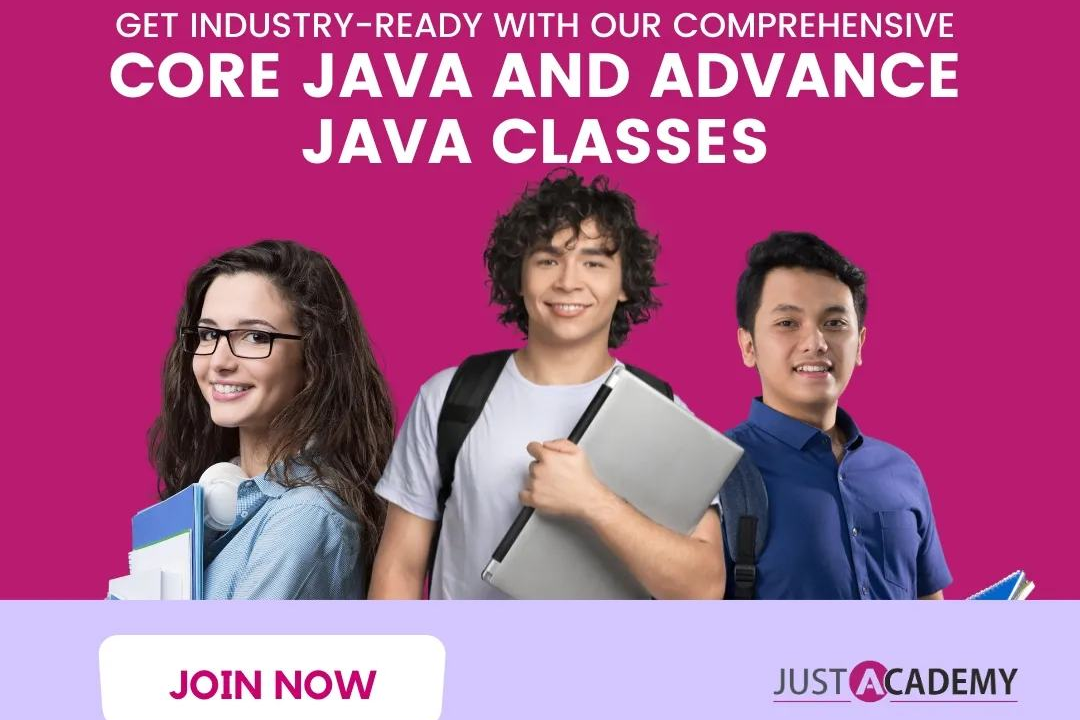core java and advanced java
Mastering Core and Advanced Java: A Comprehensive Guide
core java and advanced java
Core Java refers to the foundational concepts and features of the Java programming language, encompassing its syntax, object-oriented programming principles, standard libraries, and basic APIs. It is the essential part of Java that includes Java SE (Standard Edition) and focuses on fundamental concepts such as data types, control statements, exception handling, and core libraries like java.lang, java.util, and java.io. Advanced Java, on the other hand, builds upon Core Java and delves into more complex aspects such as web applications, enterprise applications, networking, Java Database Connectivity (JDBC), JavaServer Pages (JSP), servlets, and frameworks like Spring and Hibernate. Together, they provide a comprehensive understanding required for developing robust Java applications across various domains.
To Download Our Brochure: https://www.justacademy.co/download-brochure-for-free
Message us for more information: +91 9987184296
1 - Introduction to Java: Learn about Java's history, its features such as platform independence, and the Java Virtual Machine (JVM).
2) Basic Syntax and Data Types: Understand Java syntax, keywords, data types, variables, and operators. This includes primitive types like `int`, `char`, and `boolean`.
3) Control Statements: Explore decision making statements like `if`, `switch`, and loops like `for`, `while`, and `do while`.
4) Object Oriented Programming (OOP): Study the principles of OOP, including classes, objects, inheritance, polymorphism, encapsulation, and abstraction.
5) Exception Handling: Learn how to handle exceptions using try catch blocks, finally statement, throwing exceptions, and creating custom exceptions.
6) Java Collections Framework: Familiarize yourself with the Collections Framework, including List, Set, Map, and their implementations such as ArrayList, HashSet, and HashMap.
7) Java I/O Streams: Understanding input and output operations in Java using classes from `java.io` package, including reading and writing files.
8) Multithreading: Gain insights into multithreading, including the creation of threads, synchronization, and inter thread communication.
9) Java Applets and GUI: Introduction to Java applets and Graphical User Interface (GUI) development using AWT and Swing libraries.
10) Java Database Connectivity (JDBC): Learn how to interact with databases using JDBC, including establishing connections and executing SQL queries.
11) Basic Networking: Understand the basics of network programming in Java, including sockets, datagrams, and URL handling.
12) Java Development Environment: Setting up the Java development environment using IDEs like Eclipse, IntelliJ IDEA, and understanding build tools like Maven and Gradle.
#### Advanced Java
13) Java Servlets: Introduction to Java Servlets, the Java EE technology for constructing web applications, and the client server architecture.
14) JavaServer Pages (JSP): Learn about JSP technology for creating dynamic web content and how it integrates with servlets.
15) Frameworks Overview: Get an overview of popular Java frameworks like Spring and Hibernate which simplify enterprise application development.
16) Web Services and RESTful APIs: Understand the basics of web services, SOAP, REST, and how to develop RESTful APIs in Java.
17) Java Enterprise Edition (Java EE): Explore Java EE technologies, including Enterprise JavaBeans (EJB), Java Message Service (JMS), and Java Persistence API (JPA).
18) Security in Java: Learn about security features in Java applications, including authentication, authorization, and cryptography.
19) Microservices Architecture: Introduction to microservices architecture using Spring Boot and how to design scalable applications.
20) Concurrency and Parallelism: Delve deeper into advanced concurrency utilities provided by the Java `java.util.concurrent` package for more efficient multi threaded programming.
21) Deployment and Containerization: Understand how to deploy Java applications using tools like Docker and orchestration platforms like Kubernetes.
22) Testing in Java: Learn about testing frameworks like JUnit and Mockito for unit testing and integration testing in Java applications.
Conclusion
This training program provides a comprehensive understanding of both Core Java and Advanced Java concepts. By the end of this course, students will be well prepared to handle real world Java development challenges and be equipped with the skills required for a successful career in software development using Java.
Browse our course links : https://www.justacademy.co/all-courses
To Join our FREE DEMO Session: Click Here
Contact Us for more info:
Flutter Training in Tenkasi
Android Application Development Course
Flutter Training in Ganjbasoda
Flutter Training in Kakinada
iOS Training in Sangli











